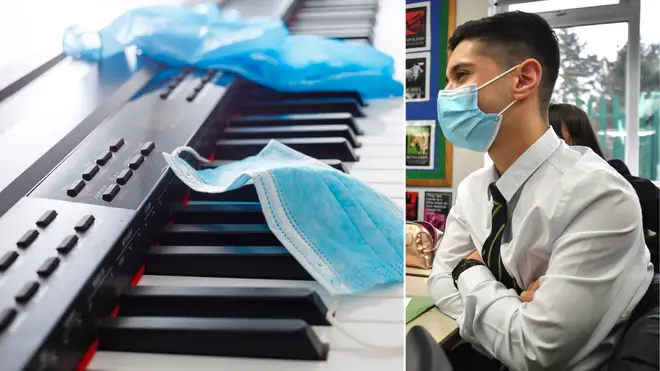Schools in England told they may need to suspend ‘specialist’ subjects, like music
5 January 2022, 12:43

Subjects including music are at risk of being suspended to cope with staff sickness due to COVID-19.
Listen to this article
As children across the UK return to school this week, headteachers are already reporting staff absence levels of 10 percent due to the Omicron variant.
Earlier this week, the Chairman of Ofqual (The Office of Qualifications and Examinations Regulation), Ian Bauckham, proposed several “exceptional, emergency timetable changes”; one of which included suspending specialist subjects, like PSHE and music, to free up staff members.
In a case study posted on the Department for Education (DfE) portal for Headteachers, Bauckham justified his suggestion by writing that staff absences could reach a point “where resources can be stretched too thinly and alternatives, however undesirable, become necessary.”
He explains, “In cases where a specialist teacher rotates between classes to teach subjects that sometimes include for example PSHE, RSHE or music, it may be possible temporarily to suspend the teaching of that subject and use that teacher to teach classes whose normal teacher is absent and unable to teach remotely.”
Read more: A level music in schools could ‘disappear’ in little more than a decade
As long as @IanBauckham and @ofqual continue to see music as utterly dispensable, what point is there in continuing with #NPME2 @educationgovuk? What happened to the recovery curriculum? Music is needed now more than ever. 😤 https://t.co/CKoobXpZhF
— Chrissy Kinsella (@ChrissyKinsella) January 4, 2022
Chrissy Kinsella, CEO of the London Music Fund, wrote on Twitter that if Ofqual continues “to see music as utterly dispensable, what point is there in continuing with [National Plan for Music Education version 2]?”.
The National Plan for Music Education (NPME) set out the government’s vision for music education between 2011 and 2020. In February 2020, the DfE announced a call for evidence, to inform proposals for a refreshed National Plan for Music Education (NPME2), which is now expected this year.
If music is having to be sacrificed in schools, it casts doubt on how a consultation into changes to music education might continue.
Read more: Government invites ‘music experts’ to create new school music syllabus
This isn’t the first time music education has suffered during the pandemic. In 2020, school choirs and ensembles were suspended due to concerns that singing, wind and brass playing could increase the risk of COVID-19 transmission among staff and pupils.
Despite an industry backlash from key figures, including the Incorporated Society of Musicians, in 2020, the school subject of music is once again at risk.
In her tweet, Kinsella highlights that the proposed emergency timetable changes, could be in direct contrast to the “rovery curriculum”.
This curriculum was mentioned in DfE’s guidance, first published in July 2021, titled Teaching a broad and balanced curriculum for education recovery.
The guidance called for all schools to “continue to teach a broad and balanced curriculum in all subjects”, despite the pandemic, and the document went on to urge that “schools should take every opportunity – both through and outside the school curriculum – to foster pupils’ re-engagement with a wide range of music.”
Workforce 👨🏽🏫
— Nadhim Zahawi (@nadhimzahawi) January 2, 2022
I have asked former teachers who have either left the profession or retired to come forward to temporarily support workforces for the new term.
I know many have stepped forward and it's this Blitz spirit that will be essential in turning the tide on Covid.
[5/8]
In order to combat staff shortages, Nadhim Zahawi, the UK’s Secretary of State for Education, has asked retired teachers, or those who have left the profession for career changes, to come forward temporarily to support workforces for the new term.
New advice also means that students are back to wearing face masks in classrooms in England, and many pupils are reportedly having to wear coats during their lessons as windows are left open for ventilation, causing low classroom temperatures.
Music has been on a downward turn in schools since 2010. Figures published by Ofqual in 2020 revealed that student numbers for Music A Level had nearly halved in the previous decade, with GCSE entries declining by a quarter.
In response to declining figures, UK Music chief executive Jamie Njoku-Goodwin said: “There has been a worrying decline in the number of young people studying music at A-level in recent years. Unless action is taken to reverse that trend, there is a real risk of serious damage to the talent pipeline on which the music industry relies.
“Music education enriches the lives of countless children and young people, but it also brings huge cultural, economic and social benefits to the UK.”


































